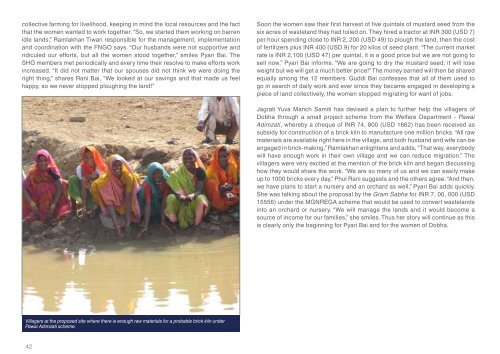Trail Blazers - IFAD
Trail Blazers - IFAD
Trail Blazers - IFAD
You also want an ePaper? Increase the reach of your titles
YUMPU automatically turns print PDFs into web optimized ePapers that Google loves.
collective farming for livelihood, keeping in mind the local resources and the fact<br />
that the women wanted to work together. “So, we started them working on barren<br />
idle lands,” Ramlakhan Tiwari responsible for the management, implementation<br />
and coordination with the FNGO says. “Our husbands were not supportive and<br />
ridiculed our efforts, but all the women stood together,” smiles Pyari Bai. The<br />
SHG members met periodically and every time their resolve to make efforts work<br />
increased. “It did not matter that our spouses did not think we were doing the<br />
right thing,” shares Rani Bai, “We looked at our savings and that made us feel<br />
happy, so we never stopped ploughing the land!”<br />
Soon the women saw their first harvest of five quintals of mustard seed from the<br />
six acres of wasteland they had toiled on. They hired a tractor at INR 300 (USD 7)<br />
per hour spending close to INR 2, 200 (USD 49) to plough the land, then the cost<br />
of fertilizers plus INR 400 (USD 9) for 20 kilos of seed plant. “The current market<br />
rate is INR 2,100 (USD 47) per quintal, it is a good price but we are not going to<br />
sell now,” Pyari Bai informs. “We are going to dry the mustard seed; it will lose<br />
weight but we will get a much better price!” The money earned will then be shared<br />
equally among the 12 members. Guddi Bai confesses that all of them used to<br />
go in search of daily work and ever since they became engaged in developing a<br />
piece of land collectively, the women stopped migrating for want of jobs.<br />
Jagrati Yuva Manch Samiti has devised a plan to further help the villagers of<br />
Dobha through a small project scheme from the Welfare Department - Pawai<br />
Adimzati, whereby a cheque of INR 74, 800 (USD 1662) has been received as<br />
subsidy for construction of a brick kiln to manufacture one million bricks. “All raw<br />
materials are available right here in the village, and both husband and wife can be<br />
engaged in brick-making,” Ramlakhan enlightens and adds, “That way, everybody<br />
will have enough work in their own village and we can reduce migration.” The<br />
villagers were very excited at the mention of the brick kiln and began discussing<br />
how they would share the work. “We are so many of us and we can easily make<br />
up to 1000 bricks every day,” Phul Rani suggests and the others agree. “And then,<br />
we have plans to start a nursery and an orchard as well,” Pyari Bai adds quickly.<br />
She was talking about the proposal by the Gram Sabha for INR 7, 00, 000 (USD<br />
15556) under the MGNREGA scheme that would be used to convert wastelands<br />
into an orchard or nursery. “We will manage the lands and it would become a<br />
source of income for our families,” she smiles. Thus her story will continue as this<br />
is clearly only the beginning for Pyari Bai and for the women of Dobha.<br />
Villagers at the proposed site where there is enough raw materials for a probable brick kiln under<br />
Pawai Adimzati scheme.<br />
42

















